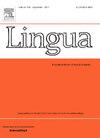L2-L3同源词与L1-L2-L3同源词课堂学习:提高L2-L3相似度认知的纵向实验
IF 1.3
3区 文学
0 LANGUAGE & LINGUISTICS
引用次数: 0
摘要
我们研究了L3单词知识是如何受到学习者与先前语言(L1和L2)相似性和跨语言相似性意识的影响的。我们的参与者是初级意大利语学习者(N = 35, Mage = 19.71),说l1 -波兰语,说l2 -英语。除了常规的课堂活动,我们使用量身定制的练习来教授我们的参与者120个l3 -意大利语单词:40个L2-L3同源词,40个L1-L2-L3同源词和40个非同源词,控制了一系列与项目相关的变量。我们还将参与者随机分配到两组:对照组和同源意识提高组,在那里我们通过互动在线研讨会操纵参与者对l2 -英语- l3 -意大利语跨语言相似性的认识。在前测和后测中,我们测试了学习者将一个二级英语单词翻译成三级意大利语的能力,以及在句子中使用这个三级单词的能力。混合效应logistic回归结果显示,同源词的学习效果优于非同源词,而L1-L2-L3和L2-L3同源词的学习效果无显著差异。重要的是,同源意识提升训练对L1-L2-L3同源的学习有促进作用,而对L2-L3同源的学习没有促进作用。我们的研究结果表明,任何跨语言相似性都能提高记忆,但如果参与者意识到L3 - l2 -L3相似性的存在,L3词汇学习主要是由累积的L1-L2-L3相似性促进的。本文章由计算机程序翻译,如有差异,请以英文原文为准。
Learning L2-L3 cognates and L1-L2-L3 cognates in class: A longitudinal experiment in raising awareness of L2-L3 similarity
We investigated how L3 word knowledge is impacted by similarity to learners’ previous languages (L1 and L2) and awareness of cross-linguistic similarities. Our participants were L1-Polish speakers with L2-English who were beginner learners of L3-Italian (N = 35, Mage = 19.71). Alongside regular classroom activities, we used tailor-made exercises to teach our participants 120 L3-Italian words: 40 L2-L3 cognates, 40 L1-L2-L3 cognates, and 40 noncognates, controlled for a range of item-related variables. We also randomly assigned participants to two conditions: a control group and a cognate-awareness-raising group, where we manipulated participants’ awareness of L2-English-L3-Italian cross-linguistic similarity through interactive online workshops. In the pretest and posttest, we tested learners’ ability to translate an L2-English word to L3-Italian and to use the L3-word in a sentence. Results of mixed-effect logistic regressions showed that the cognates were learned better than noncognates, but there was no difference between L1-L2-L3 and L2-L3 cognates. Importantly, the cognate-awareness-raising training enhanced the learning of L1-L2-L3 cognates, but not of L2-L3 cognates. Our results suggest that any cross-linguistic similarity improves retention, but L3 lexical learning is primarily facilitated by cumulative L1-L2-L3 similarity if the participant is aware of its existence.
求助全文
通过发布文献求助,成功后即可免费获取论文全文。
去求助
来源期刊

Lingua
Multiple-
CiteScore
2.50
自引率
9.10%
发文量
93
审稿时长
24 weeks
期刊介绍:
Lingua publishes papers of any length, if justified, as well as review articles surveying developments in the various fields of linguistics, and occasional discussions. A considerable number of pages in each issue are devoted to critical book reviews. Lingua also publishes Lingua Franca articles consisting of provocative exchanges expressing strong opinions on central topics in linguistics; The Decade In articles which are educational articles offering the nonspecialist linguist an overview of a given area of study; and Taking up the Gauntlet special issues composed of a set number of papers examining one set of data and exploring whose theory offers the most insight with a minimal set of assumptions and a maximum of arguments.
 求助内容:
求助内容: 应助结果提醒方式:
应助结果提醒方式:


